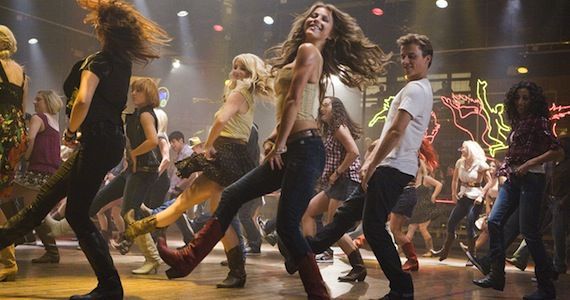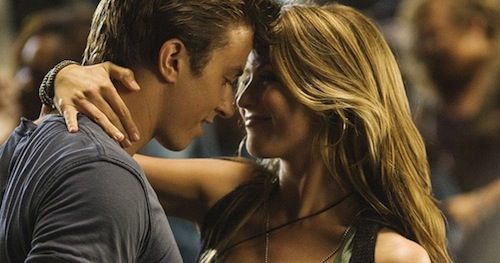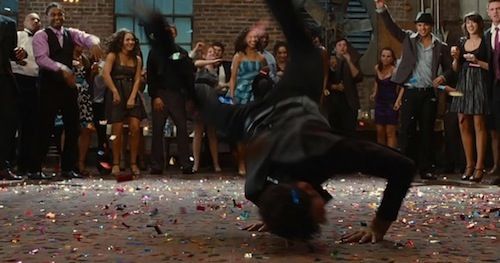Anyone who had little interest in the Footloose remake to begin with, it's unlikely that Brewer's interpretation will overcome that skepticism.
These days, there's no shortage of '80s remakes in Hollywood, but very few of these films succeed in recreating their respective campy premises while managing to keep a straight face. Plenty of remakes attempt to be "modern" or "gritty" but within the first five minutes of Craig Brewer's Footloose, it's apparent that the director isn't simply aiming to cash in on Kevin Bacon's iconic role as rebellious dancer hunk, Ren McCormack - he's attempting to turn the campy premise inside out and present a film that offers more than just entertaining choreography and sexy scenery (though there is still an over-abundance of the the latter).
After all, there's a pretty large range of material between the hammy premise of a town where dancing is outlawed and story beats that directly tackle physical and emotional violence. Does the director find a successful balance that brings out the charm of the original Footloose to a modern audience, while also addressing the film's more emotionally intense subject material?
Fortunately Brewer gets more right than he gets wrong - and while Footloose may still be an unneeded remake, with a few key problems that hold it back, the film manages to offer some genuinely entertaining as well as touching moments. That said, Brewer's Footloose is exactly what most moviegoers are going to expect, based on their experience with either the original film, or the remake's melodramatic (and dance-heavy) marketing - so anyone looking for a hard-hitting character drama or over-the-top dance movie will probably be less impressed by the final product. However, for moviegoers that are open to an on-the-nose teenage drama (with a couple surprisingly genuine performances) that features a number of campy dance sequences and musical montages, Footloose actually delivers.
The story is still a major challenge that the filmmakers had to overcome - given that the premise is especially hard to justify in a "modern" setting (where parents have much worse things to worry about than dancing and loud music). Following a drunk driving accident that leaves five youths dead, the town of Bomont - led by Reverend Shaw Moore (Dennis Quaid) - outlaws a number of social activities (drinking, rock music, and public dancing, among others) in an attempt to "protect" their young people. New guy Ren McCormack (Kenny Wormald) arrives in town from Boston to stay with his Aunt and Uncle after his mother dies, only to discover the strict code of living in Bomont. Trying to find his place in the repressed town, McCormack strikes up an interest in Ariel Moore (Julianne Hough), the Reverend's daughter - he also finds himself at odds with alpha-dog Chuck Cranston (Patrick John Flueger), and a community that has become increasingly crippled by their fears.
Surprisingly, Brewer succeeds in making the town of Bomont a believable place - which, as mentioned, is a tough task, given the film's premise. This success is largely due to an interesting juxtaposition between Quaid's Reverend Moore and McCormack's uncle, Wes Warnicker (Ray McKinnon) - characters that could have merely been reduced to caricature, in order to show the divergent viewpoints of Bomont's adults. Instead, while the characters represent different attitudes about McCormack's challenge of the status quo, the actors bring actual depth to their respective roles and, as a result, flesh out the believability of the sometimes ridiculous onscreen conversations and situations. On a similar note, the townspeople of Bomont (such as the principle and other community leaders) are a little more robust this round - instead of falling into witless parodies by the end.
The stable of teen actors are all surprisingly competent, with leads Wormald and Hough successfully conveying complicated emotions in a few especially challenging moments, as well as making several of the "dance-it-out" scenes believable enough - or, at the very least, enjoyable to watch (such as one that features a full gymnastics routine in a warehouse). The supporting cast is equally well-conceived and genuine, with characters such as Willard (Miles Teller) and Woody (Ser'Darius Blain) delivering fun counterpoints to McCormack's fish-out-of-water routine - as well as contributing to the overarching plot in subtle and enjoyable ways.
As mentioned, the film successfully tackles various character motivations (no matter how absurd) with an impressive amount of care and depth - however, stylistically, Brewer's Footloose is often at odds with its more noble story intentions. On several occasions, legitimate drama is undermined by unnecessary and gratuitous sex appeal that makes Michael Bay's approach to female objectification look prudish. It's clear that Brewer attempted to showcase the vitality of these young people in relation to their repressed and worry-obsessed community - but, after several close-up shots that frame the exposed hips and gyrating mid-drifts of Bomont High School ladies, it's clear the filmmakers were just as focused on titillating the MTV generation as they were telling a meaningful story. The waffling focus on sex appeal doesn't entirely undermine the film's substance but can, at times, make for an awkward balance when the movie suddenly shifts gears and jumps head-long into mature character drama.
Similarly, as the film roles into the third act, the resulting plot points become a mix of sharp character realizations (McCormack's appeal to the community) and completely unearned "lets put a bow on it" catharsis (which is most apparent in the conclusion to the Chuck Cranston story arc). The less-successful moments of closure aren't enough to drag down the more interesting aspects of the film's finale - but there's no doubt that moviegoers will consider some of elements of the denouement to be "tacked-on." But, as mentioned earlier, the Footloose remake actually finds an improved moment for emotional climax and plot realization when compared to the original (which devolves into a cartoony draw-down), but is still relatively jumbled and potentially anticlimactic.
Brewer's Footloose remake may not live up to the lasting iconography of the original film, and, in the grand scheme of cinema, will likely be little more than a quick and sexy flash in the pan. Moviegoers who are interested in the basic premise will find plenty of exciting choreography and enough intriguing character drama to make a trip to the theater worthwhile - but for anyone who had little interest in the Footloose remake to begin with, it's unlikely that Brewer's interpretation will overcome that skepticism.
If you’re still on the fence about Footloose, check out the trailer below:
-
[poll id="203"]
-
Follow me on Twitter @benkendrick - and let us know what you thought of the film below:
Footloose is now in theaters.



